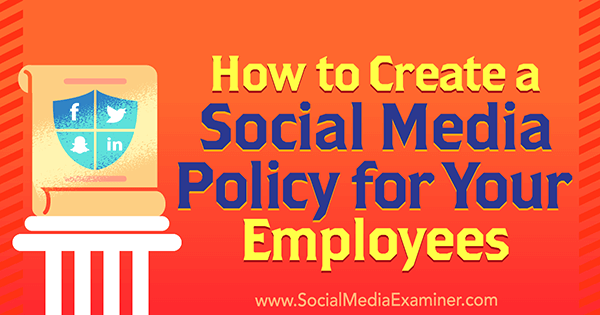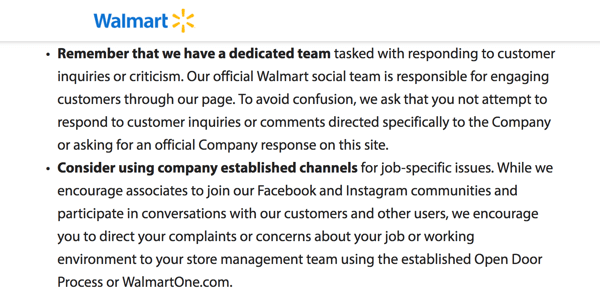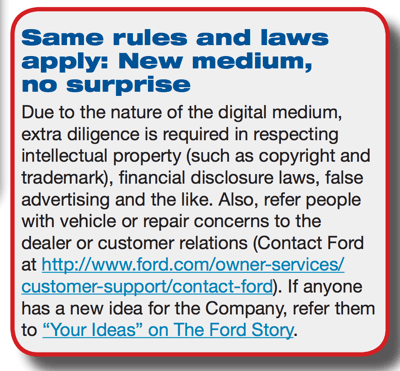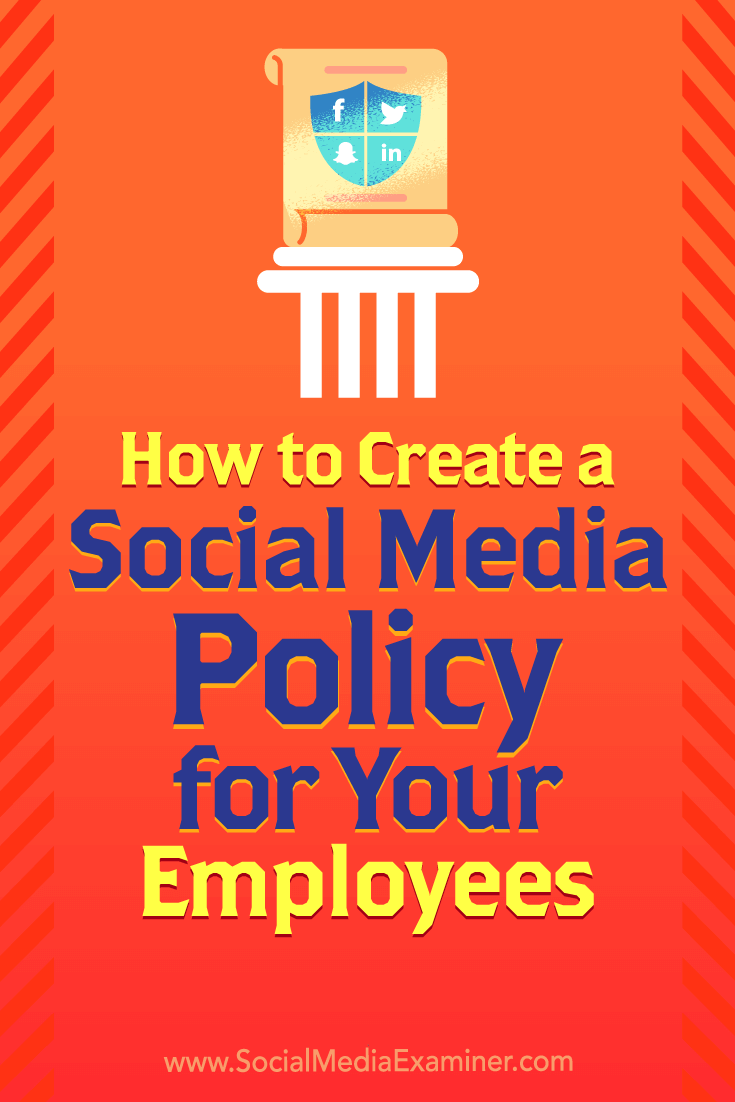 Want to help your employees better engage on social media?
Want to help your employees better engage on social media?
Wondering how a social media policy can help?
A social media policy gives your employees guidelines for interacting with customers and protecting their personal safety, as well as your business's reputation.
In this article, you'll discover three tips for creating a social media policy for your employees.

#1: Explain Who Can Speak for Your Company on Social Media
Your social media policy needs to explain who can or can't speak on behalf of the company on social media. For example, Walmart has a strict social media policy that prohibits regular employees from answering customer complaints or questions directed toward the company. Walmart has an official social media team specifically for that purpose.
Walmart's strict policy errs on the side of caution to avoid misunderstandings that can arise when an employee speaks on behalf of the company.

However, not all policies have to be as strict as Walmart's. In fact, a more relaxed policy can still protect your business and generate trust among your staff and fans. Experienced employees who are passionate about customer service may have solid advice to help customers resolve their concerns.
Whether your social media policy is more strict or relaxed depends on your business and your knowledge of your employees. Stifling employees' ability to express themselves can diminish the customer experience. However, passionate employees could be unaware that their resolutions may not be in line with the company's intentions.
If you want to allow a casual discussion environment, you can train your entire staff to engage with customers in a way that maintains the company's standards while providing customers with the experience that their voice is heard. For instance, you can train employees to provide detailed, accurate responses to customer questions, as The Best Chocolate in Town does in this Facebook post.

If you don't want casual interactions on social media because you want to maintain a strict business presence, assign social media interaction to specific staff members and train them accordingly.
#2: Create Detailed Guidelines for Business and Personal Conduct on Social Media
Your social media policy should provide detailed content guidelines for all of your employees who regularly (or occasionally) post on social media as your business. To help employees understand your expectations and create a consistent voice for the business, you can include standard responses to common situations in your policy.
To prepare, first brainstorm all of the possible situations such as unhappy customers, customers who want a refund, complaints on Yelp, libel, slander, copyright infringement, and even threats. Then decide how you want your employees on social media to handle each situation.
Handling Conflicts
Get World-Class Marketing Training — All Year Long!
Are you facing doubt, uncertainty, or overwhelm? The Social Media Marketing Society can help.
Each month, you’ll receive training from trusted marketing experts, covering everything from AI to organic social marketing. When you join, you’ll also get immediate access to:
- A library of 100+ marketing trainings
- A community of like-minded marketers
- Monthly online community meetups
- Relevant news and trends updates
On social media, conflicts about your business can escalate quickly. Your policy should give employees clear direction about how to respond. During a disagreement online, employees may want to jump into a conversation to defend the company, but it's not a good idea.
As you cover how to handle conflicts, remind employees that anytime they engage in a discussion about the company, whether they're posting as the business or from their personal accounts, they're representing the company by association, as IBM does in its Social Computing Guidelines.

To ensure conflicts are handled properly from the start, ask employees to notify you (or the person who holds the appropriate job title) of any potential online conflicts instead of engaging through your business profile or their personal profile. With this approach, you improve your ability to resolve the issue instead of doing extensive damage control.
For Every Don't, Include a Do
When your social media policy restricts employees from answering customer concerns and questions through social media, many employees will nevertheless want to help address customer concerns. When employees are prohibited from sharing their thoughts, they'll end up feeling like they can't help at all, and that could lead them to feel resentment toward the company.
When you establish ways your employees shouldn't comment on behalf of the company, explain what employees should do instead, especially when they come across a customer with a problem that needs to be resolved.

Discover Proven Marketing Strategies and Tips
Want to go even deeper with your marketing? Check out the Social Media Marketing Podcast! Publishing weekly since 2012, the Social Media Marketing Podcast helps you navigate the constantly changing marketing jungle, with expert interviews from marketing pros.
But don’t let the name fool you. This show is about a lot more than just social media marketing. With over 600 episodes and millions of downloads each year, this show has been a trusted source for marketers for well over a decade.
Ford Motor Company's Digital Participation Guidelines are a great example of how to give employees dos and don'ts. The policy provides two resources employees can give to customers: one for repair or dealer concerns, and another for people who have a new idea for the company. In both cases, employees can give customers a unique URL.

Provided employees follow this policy, Ford won't have to worry about anyone accidentally providing incorrect information to customers that could come back to bite them later. And employees can feel better knowing they've been helpful.
Posting Carefully on Personal Accounts
It's not enough to have guidelines only for employees who represent your business on social media. You need to set guidelines for your employees to follow on their personal accounts as well.
In a perfect world, it wouldn't matter what someone does in their personal life. But the truth is, your employees will always be a reflection on you and your brand in the eyes of the world. And if your employees are showing up in the world as questionable characters, people will start to wonder about you, too.
To make sure employees avoid posting anything that could potentially come back to bite you (or them) later, your policy can outline basic expectations such as respecting the law (including copyright law), checking facts and sources to verify that information is truthful, and so on.
Your policy can reinforce the importance of conduct on personal accounts by explaining how online posts can remain available forever. Although you can delete your own posts, someone can take a screenshot of it. Although search engines don't index Facebook posts, sites like Way Back Machine or those that scrape content can capture social media sites that are indexed.

#3: Protect Your Employees and Sensitive Business Information
You can't assume employees know what you consider “sensitive information.” Also, many people have a habit of sharing every aspect of their lives on social media. For these reasons, your policy needs to clarify what business-related information employees shouldn't share.
Your policy needs to prohibit posts that put your business or staff at risk and explain how or why certain information creates a risk. If you run a coffee shop, for example, information about your opening procedures can be considered sensitive information because someone can easily use it when looking to steal from or hurt your employees.
Similarly, a staff member might not think about the ramifications of posting a 4 AM update to Facebook saying they're alone in the parking lot waiting for their opening partner to show up. However, that kind of post can put the safety of your staff at risk. Your employees shouldn't tell the world when they're alone.
Also, your social media marketing team may need clear guidelines about sharing information with the public. The team will want to promote products in development, as bareMinerals does in this Twitter post. However, you don't want to share the details too soon. Your social media policy can clarify how marketers determine whether it's okay to post about new products still in development.

Online, people often talk about how they do business to demonstrate their expertise, or in the spirit of sharing and transparency that customers often value. However, if sharing this information isn't appropriate for your business, your social media policy might prohibit references to software and tools used in your daily operations.
Conclusion
It's common for some employees to bemoan the idea that they need to behave themselves on their personal social media accounts as a condition of employment. Also, hearing the term policies can send employees' eyes rolling for good reason: Many policies can be outdated, arbitrary, and serve little purpose. They can be restrictive and limit creativity and genius.
Every business owner knows implementing rules is more difficult when they alter the way things have always been done. And that rule applies to adding a social media policy to your marketing team's stack of resources.
If you need to share a new policy with your existing team, just sit down with them and explain what it is and why it's being implemented. As long as you can get them to understand how it supports the business, they're more likely to accept it without resistance.
A great way to handle this situation is by making sure your social media policies are clearly explained to all candidates prior to hiring them. This will give them a heads-up that you have high expectations and standards from the start, avoiding the potential for surprises down the road.
Your social media presence is one of the most vital components of your marketing toolbox. To protect your business, your social media policy should be transparent on all sides and structured in a way that leaves you confident you're not putting your team at risk.
What do you think? How can you use the tips in this article for your social media policy? Have you tried any ideas mentioned in this article? Please share your thoughts in the comments.

Attention Agency Owners, Brand Marketers, and Consultants

Introducing the Marketing Agency Show–our newest podcast designed to explore the struggles of agency marketers.
Join show host and agency owner, Brooke Sellas, as she interviews agency marketers and digs deep into their biggest challenges. Explore topics like navigating rough economic times, leveraging AI, service diversification, client acquisition, and much more.
Just pull up your favorite podcast app, search for Marketing Agency Show and start listening. Or click the button below for more information.

